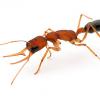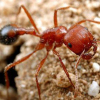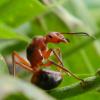Hello fellow ant keepers,
We are new to ant keeping and our Camponotus queen laid eggs about a month ago but now they have disappeared. She is in a standard test tube set-up. Any ideas on what happened? So sad to have no eggs since she is our first queen that laid.
Thank you in advance!
She ate them. This is extremely common for any queens. Sometimes ants can have the slightest bit of light on them and be extremely stressed out. This causes them to eat their eggs. It really depends on the queen. Camponotus do this quite a bit. You’ll need to find a right time to check on her. Try once every week. If she eats her eggs still then try once every two weeks and if she eats her eggs then once every three weeks or just in a month will do the trick really well. I wouldn’t risk testing her limits on how she eats her eggs because she will eventually die. Hopefully this can help.
Sent from my iPhone using Tapatalk



















